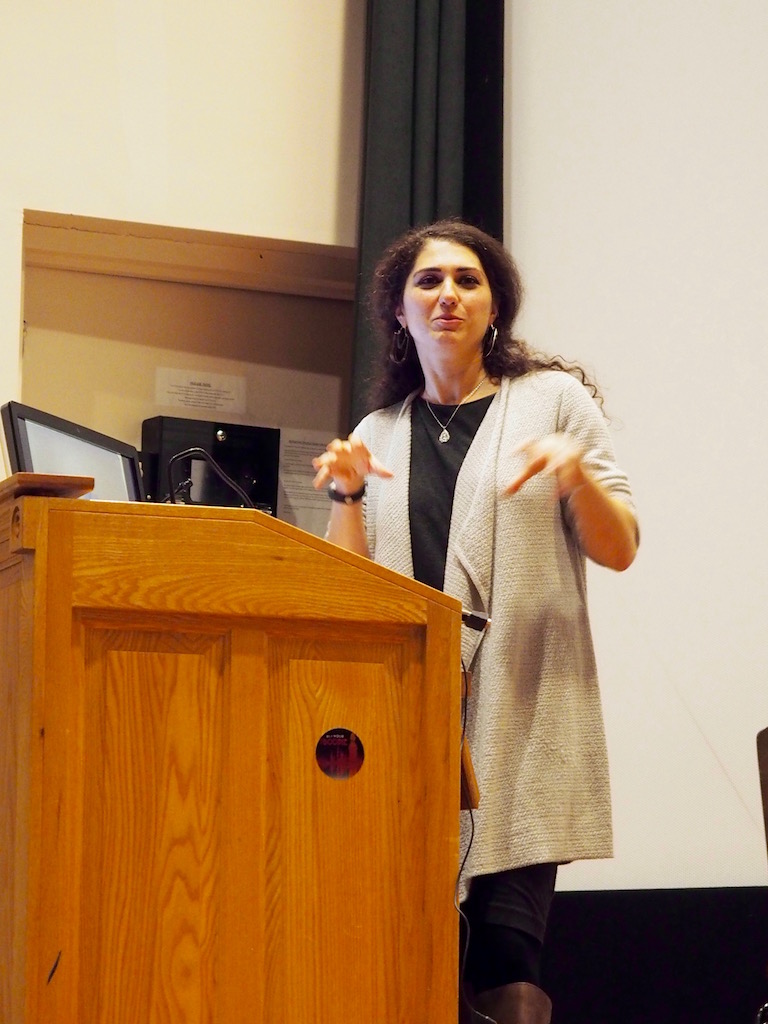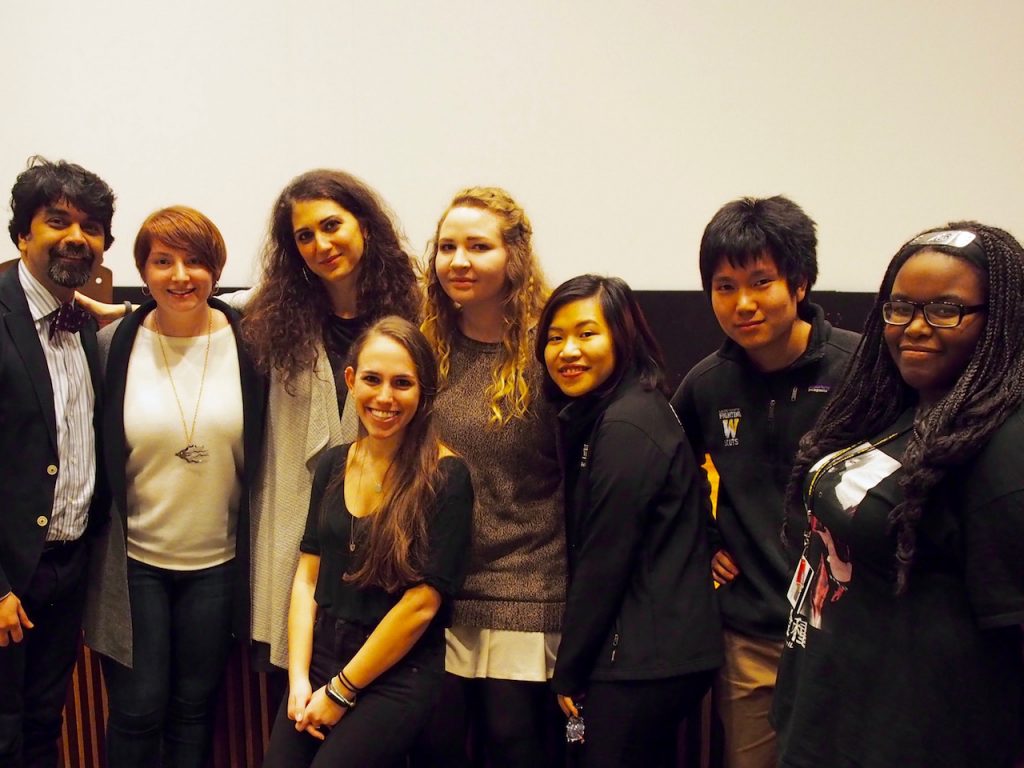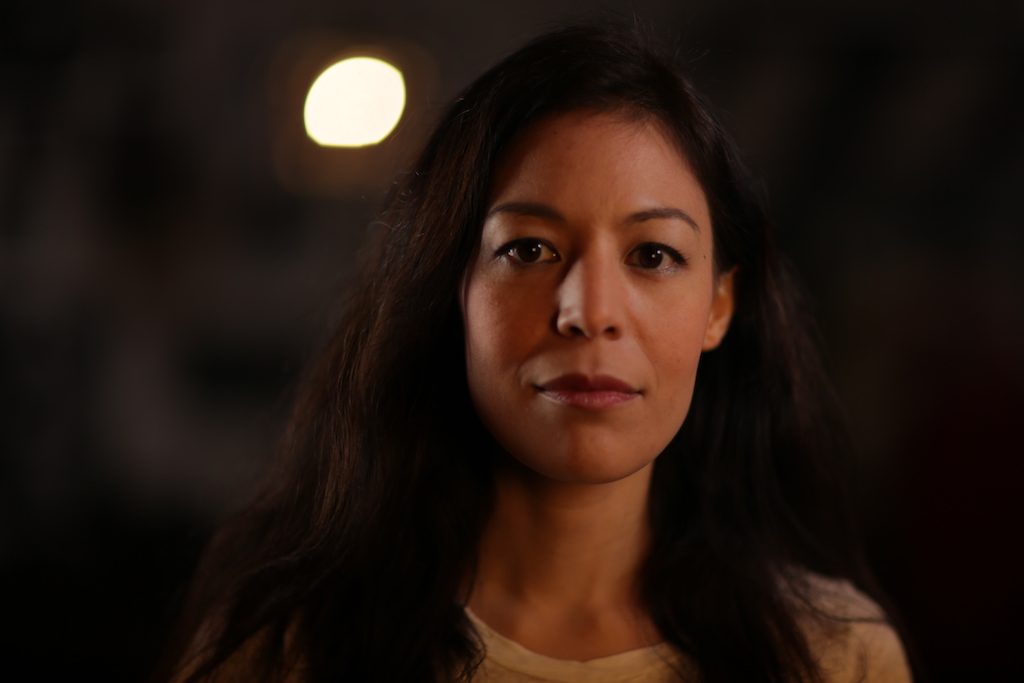Denison University students came together to speak about their refugee experience in Spring 2017. Check out the video on iTunes here: Refugees of Denison
Alia Malek reflects on her new memoir
Students from the College of Wooster, Kenyon, and Denison congregated in Granville to hear Alia Malek read and answer questions from her recently released memoir, The Home that was our Country. We were lucky to be the first stop in the public launch of the book.
Malek is an author and civil rights lawyer. Born in Baltimore to Syrian immigrant parents, she began her legal career as a trial attorney at the U.S. Department of Justice’s Civil Rights Division. She has worked in the legal field in the U.S., Lebanon, and the West Bank until she returned to complete a master’s degree in journalism from Columbia University. Since then, she has written for various international media outlets including New York Times and Jadaliyya. She has authored multiple books including “A Country called Amreeka”. In 2016, she was awarded the 12th annual Hiett Prize in the Humanities.

In her memoir she weaves stories about her family in Syria and the United States with the socio-political history of the region. At the talk, she narrated the complicated nature of her family’s personal journeys between Syria and the United States. She highlighted definitive moments in her life such as a visit to Syria after she graduated from high school. In this story about her arrival at the Syrian airport, “camcorder in hand”, she deftly illustrates her journey to finding a voice in the presence of the arbitrary policy practices of the Syrian regime.
One aspect that Malek dwelled upon was sectarianism and the problematic way in which the media and the west understands the Syrian and Middle Eastern conflict. She quoted Bassem Haddad who argues that when we hear about the Middle East “One finds very little about the political connections of these rulers with their regional and international supporters/bankrollers.” Their complicity is just as important as those of the local elites in telling the story of the Arab uprisings.
Further, Bassem Chit, has suggested that, “Sectarianism’s role in the political and ideological arena has always been centred on redefining a crisis in a new ideological form – an attempt to reproduce a “new” hegemony to conceal the crisis of bourgeois society. The reason why religion still plays an important role in defining political expression in Arab and Middle Eastern societies is due to Western colonial rule. Capitalism created both nationalism and sectarianism, defined as a reaction and a by-product of the crude social transformations it generated.
Before colonial occupation, religious institutions in the Middle East did not rise to the commanding heights as those in the West. Instead they played a servile role to the existing autocracies. Under the Ottoman Empire the Qanun (the secular legal system) coexisted with religious law (Sharia).
During the period of deteriorating feudal power religious institutions shifted their allegiance to the new bourgeois classes, and in some cases these institutions expanded their power base through the acquisition of land or by encouraging capitalist investments in land under their control.”
To understand Syria today, it may be better to study this “contact zone” historically with reference to global and local process that shaped the extant power relationships.

Sonia Kennebeck to screen documentary on the human cost of US drone program
The College of Wooster is excited to host Director Sonia Kennebeck who will screen her film, “National Bird” on Tuesday Feb 21st at 7:30 pm in Scheide. The event is free and open to the public. The film is an investigative documentary that explores the complex issue of drone warfare from a human perspective. Through this film, the director/producer, Sonia Kennebeck hopes to enrich the public discourse on the U.S. drone program.  The film illuminates the impact the drone program has on people – veterans and survivors. It asks the audience to confront the human side of the drone program. In a recent article in the Guardian – Heather Linebaugh, one of the whistleblowers wrote: “Whenever I read comments by politicians defending the Unmanned Aerial Vehicle Predator and Reaper program – aka drones – I wish I could ask them a few questions. I’d start with: “How many women and children have you seen incinerated by a Hellfire missile? Few of these politicians who so brazenly proclaim the benefits of drones have a real clue of what actually goes on. I, on the other hand, have seen these awful sights first hand.” Another drone operator echoes, “Its like borders don’t matter anymore”.
The film illuminates the impact the drone program has on people – veterans and survivors. It asks the audience to confront the human side of the drone program. In a recent article in the Guardian – Heather Linebaugh, one of the whistleblowers wrote: “Whenever I read comments by politicians defending the Unmanned Aerial Vehicle Predator and Reaper program – aka drones – I wish I could ask them a few questions. I’d start with: “How many women and children have you seen incinerated by a Hellfire missile? Few of these politicians who so brazenly proclaim the benefits of drones have a real clue of what actually goes on. I, on the other hand, have seen these awful sights first hand.” Another drone operator echoes, “Its like borders don’t matter anymore”.
Like previous advancements in military technology, combat drones have transformed warfare, outpacing the ability of legal and moral frameworks to adapt and address these developments. A broad public discourse is critical to understanding the social cost of drone warfare.
Screening and Conversation with the director is sponsored by: Global and International Studies, Political Science, Cultural Events and the GLCA Grand Challenge Grant. Wooster’s Grand Challenge Grant will build an interdisciplinary research and learning community beyond the borders of our educational institutions. Our goal is to recast limiting notions of migration towards inclusive notions of mobility and movement. We also want to extend the idea of mobility to include objects and ideas and suggest that mobility is part of being. In inviting Kennebeck, we are exploring how mobile war technology has altered the forms of interaction between soldiers, states, citizens, and the victims of war.
Zotero Group
We are curating an annotated bibliography of readings that will inform our endeavor. Please join and contribute to our Zotero group.
Sayed Kashua’s Lecture
Sayed Kashua launched our Challenging Borders series with a discussion on “Transgressing Boundaries: Culture as a vehicle for socio-political change.” With his unique wit and ability to see humor in the most dire circumstances, he described his journey to “exile” from Jerusalem to Champagne, Illinois. In Champagne, he teaches Hebrew and is the Clinical Professor of Jewish Culture and Society. In telling this and many other stories, he offers a corrective to the historical understanding of the nature of the apartheid imposed by the Israeli state on Arab Palestinians since the Nakba in the 1940s. He also illustrates how Israeli government policies and patriarchal family structures have diminished the motility of Arabs living in Israel.
A full transcript of the lecture is available here.
